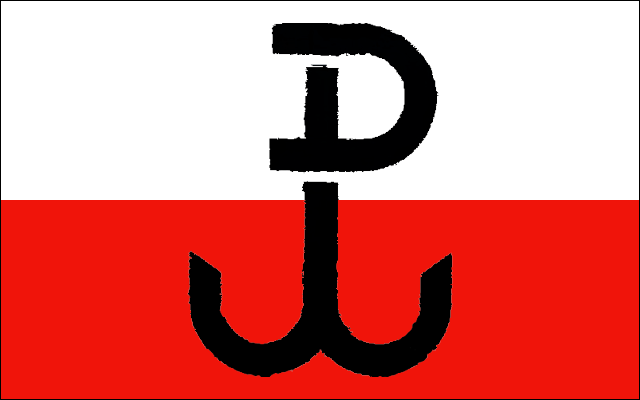The Armia Krajowa were brave fighters specifically as they were fighting against a much more advanced army that had already occupied their nation. They were the second largest resistance group after the Yugoslav Partisans if i'm not mistaken. I also think they supplied arms and other forms of assistance to the Jews during the Warsaw Ghetto Uprising and even tried to blow up the walls. Some people say that they were as anti-semetic as the nazis themselves, I don't know how true that is however.
My grandfather was from the city of Lodz and I'm not sure what he thinks of the AK.
Their flag:

In fact Jewish Underground was part of Polish one:
3. The Jewish Underground:
About that time, the first preparations for armed resistance began in the ghettos. In October 1942, leaders of the incipient Jewish underground joined in forming the Jewish National Committee, composed of representatives of all Jewish organizations, with the exception of BUND. This led to the creation of the Coordination Commission, which logically became in time the central political body of the Jewish underground. Irrespective of this, both BUND and the Jewish National Committee had their separate representatives remaining "on the Aryan side" and maintaining regular contact with the Government Delegate. Dr. Adolf Berman (Borowski) represented the Jewish National Committee, and Dr. Leon Feiner (Berezowski) was the representative of BUND.
On July 28, 1942, the Fighting Organization of the Warsaw ghetto was born. "On the Aryan side," it was represented by Arie Wilner (pseudonym: Jurek). On December 2, 1942, the Fighting Organization, its composition enlarged by that time, took a new name: Jewish Fighting Organization ("Zydowska Organizacja Bojowa"--ZOB). The Jewish Fighting Organization was commanded by Mordecai Anielewicz. At the time of the Ghetto Uprising, it had about 22 combat groups (20-30 men in each), over 700 combat soldiers in all. Liaison with the Home Army was maintained by Arie Wilner, who was in touch with the head of the Jewish Section of the High Command of the Home Army, Henryk Wolinski (pseudonym: Waclaw).
The Jewish representatives--Dr. Adolf Berman for the Jewish National Committee, Dr. Leon Feiner for BUND, and Arie Wilner for the Jewish Fighting Organization--declared their willingness to subordinate the activities of their organizations to the Government Delegate and the High Command of the Home Army. At the same time they asked for arms and ammunition, for financial assistance, and help with the training. The Delegate accepted the declaration and promised to extend help, while the Commander of the Home Army, in his order of November ll, 1942, acknowledged the Jewish Fighting Organization as a paramilitary organization and instructed them to employ the Home Army's organizational methods and fighting tactics. Simultaneously, the High Command assigned Major Stanislaw Weber (pseudonym Chirurg) and Captain Zbigniew Lewandowski (pseudonym: Szyna) to organize assistance for the Jewish Fighting Organization. Accordingly, the first ten guns and ammunition were passed on to the Jewish Fighting Organization in December 1942, and another ten guns and ammunition in January 1943. For his part, the Government Delegate established the Jewish section of the Delegacy, headed at first by Witold Bienkowski (pseudonym:Kalski) and later by Wladyslaw Bartoszewski (pseudonym: Ludwik), who was decorated after the war with the Israeli medal of Yad Vashem.
Thus the historical joining together of the Polish and the Jewish underground movements was completed. The manner in which it was accomplished testified to the loyalty of the Jewish citizens of Poland to the Polish state.
Also active in the ghetto was another Jewish military organization, which did not merge with the Jewish Fighting Organization. The Jewish Military Union ("Zydowski Zwiazek Wojskowy"--ZZW) consisted of three combat groups, about 400 men in all, mostly former officers and non-commissioned officers of the Polish Army and members of a Zionist organization, BETAR. It was commanded by Pawel Frenkel. The Jewish Military Union established contact with the Government Delegate and the High Command of the Home Army through a Polish underground organization, the Corps for Security.
Within the framework of cooperation between the Polish and the Jewish underground, and at the request of Dr. Feiner, the High Command of the Home Army sent a dispatch to Jewish organizations in London, which responded by forwarding through the Home Army channels the first $5,000 for BUND. This initiated other, more frequent and larger shipments of money, sent to the Jewish organizations via the underground channels of the Government Delegate and the High Command of the Home Army. Contact was also established by means of the Home Army and the Delegacy transmitters with Jewish organizations in the United States.
http://www.ucis.pitt.edu/eehistory/H200Readings/Topic4-R3.html